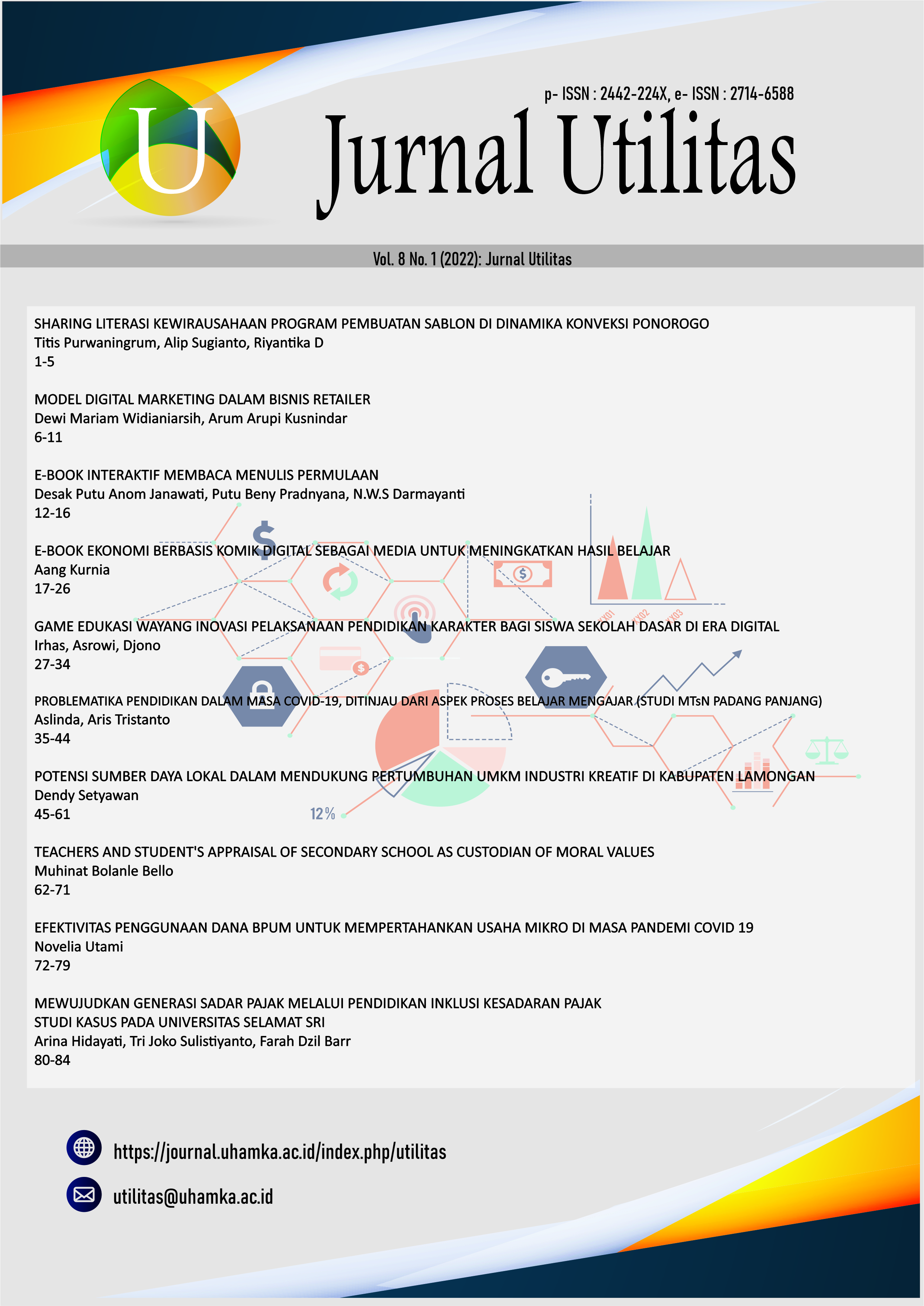E-BOOK EKONOMI BERBASIS KOMIK DIGITAL SEBAGAI MEDIA UNTUK MENINGKATKAN HASIL BELAJAR
DOI:
https://doi.org/10.22236/utilitas.v8i1.8587Abstract
The aim of economic e-book development based digital comics is as a medium to improve learning outcomes. The development stage employed Borg and Gall's model consisting of 10 stages and this development is limited to the eighth stage: large-scale tryout. The e-book tryout stage was conducted through expert validation and tryout with students. The instruments used in this research were questionnaire and test. The method used was pretest posttest control group design. Considering the result of t-test, it could be found that the posttest value of experiment class was better (84.29), while that of control class was only 79.80. Furthermore, in the effectiveness test on digital comic-based economy e-book using t-test withy IBM SPSS 20 software help, it could be seen that the significance value was 0.000 and this value was less than 0.05, meaning that H1 was supported. This value was confirmed with tstatistic of 3.804 > ttable of 2.021. It suggested that the mean score of learning outcomes for experiment class students was better that that for control ones and it could be concluded that the digital comic-based economy e-book effectively improved the students' learning outcome.
Downloads
References
Anuradha, K.T & Usha, H. . (2015). Use of E-books in an Academic and Research Environment: A Case Study from the Indian Institute of Science. Journal Center for Science Information, Indian Institite of Science, Bangalor, India, 59(6), 489–511.
Borg, W.R. & Gall, M. . (1983). Educational Research: An Intriducation (Fourth Edi). New York: Longman.
Buchori, A., dan Setyawati, R. . (2015). Development Learning Model of Character Education Through E-comic in Elementary School. International Journal If Education and Research, 3(9), 369–386.
Daryanto. (2010). Media Pembelajaran. Yogyakarta: Gava Media.
Embong, A.M., Noor, A.M., Hashim, H.M., Ali, R.M., dan Shaari, Z. . (2012). E-book as Textbook in the Classroom. Procedia Social and Behavioral Sciences. 47(5), 1802–1809.
Han, S. (2012). Big Moves to Improve the Quality of Teacher Education in China. On the Horizon, 20(4), 324–335.
Jihad, A. & Haris, A. (2013). Evaluasi Pembelajaran. Yogyakarta: Multi Pressindo.
Jindal, S & Pant, A. (2011). Availability of E-book in Science: Case Study of University of Delhi. 31(3), 313–328.
Letendre, G.K. & Wiseman, A. . (2015). The Challenges of Teacher Effectiveness and Quality Worldwide. International Perspectives on Education and Society, 27(2), 1–38.
Muchlish, M. (2009). Pelaksanakan PTK itu Mudah. Jakarta: Bumi Aksara.
Mudjiono, D. dan. (2009). Belajar dan Pembelajaran. Jakarta: Rineka Cipta.
Rasiman., dan Pramasdyahsar, A. S. (2014). Development of Mathematics Learning Media E-comic Based on Flip Book Maker to Intereas the Critical Thinking Skill and Character of Junior High School Students: Journal of Education and Research, 2(11), 535–544.
Ratnawulan, E. dan R. (2015). Evaluasi Pembelajaran. Bandung: Sinar Baru Algensindo.
Rota, G., dan Izquierdo, J. (2009). Comic as a Tool for Teaching Biotechnology in Primary Schools. Electronic Journal of Biotechnology, 6(2), 86–89.
Sharpe, J., dan Izadkhah, Y. . (2014). Use of










